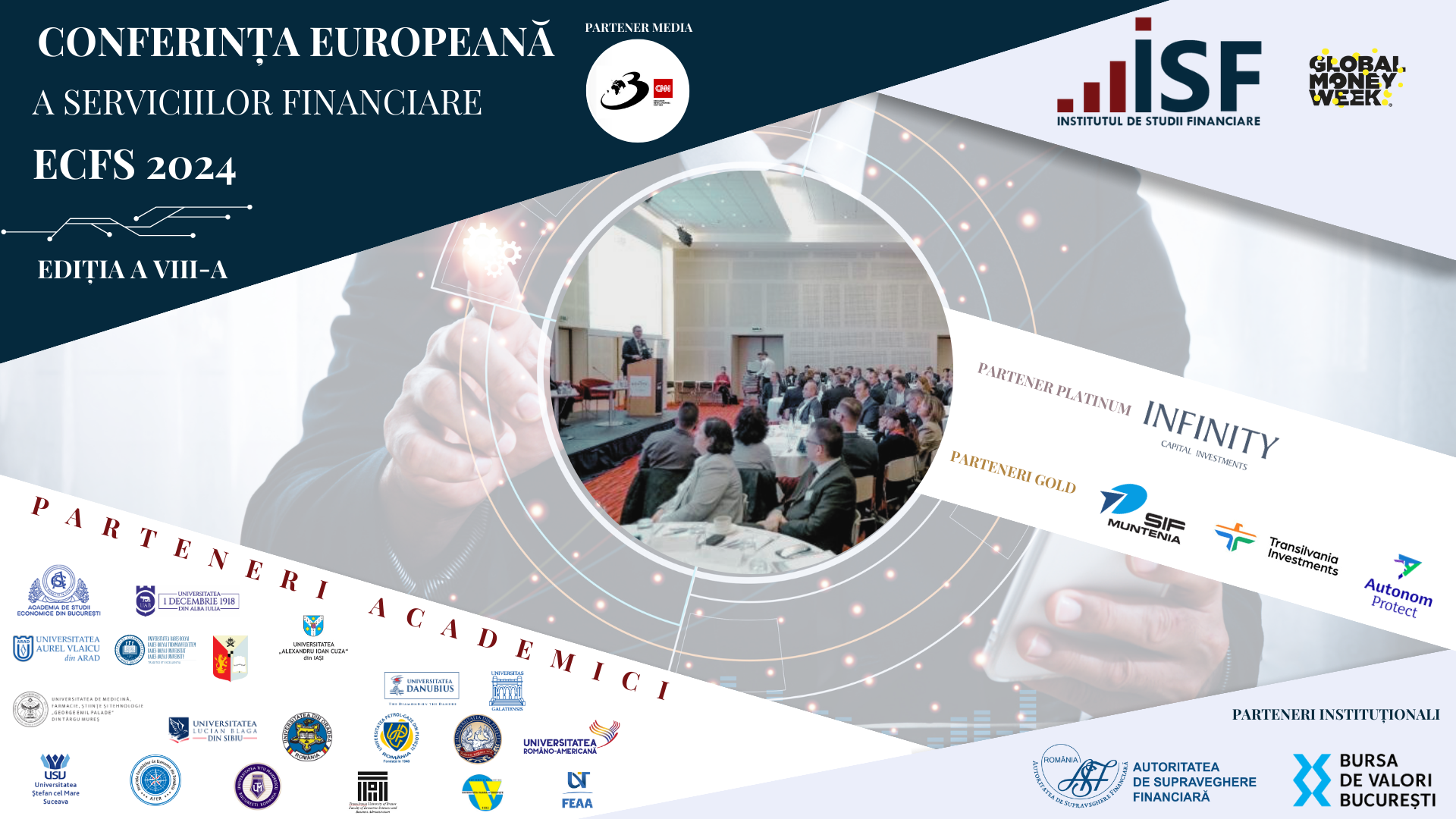Personalities from Romania’s academic, administrative, and business environments gathered at the 8th edition of the European Financial Services Conference, under the umbrella of ISF. This year’s theme: Digitalization.

Personalities from Romania’s academic, administrative, and business environments gathered at the 8th edition of the European Financial Services Conference, under the umbrella of ISF. This year’s theme: Digitalization.
On March 28 and 29, 2024, the 8th edition of the European Financial Services Conference took place in Brașov. This time, the topic launched for debate by the Institute of Financial Studies (ISF) was digitalization, specifically “DIGITALIZATION & SUSTAINABILITY IN THE FINANCIAL SECTOR – REGULATIONS AND RECOMMENDED PRACTICES”. The event was attended by representatives from academia, specialists from the administrative sector, and several leaders from the business sector, particularly from insurance and capital markets. Institutional partners included the Financial Supervisory Authority (ASF) and the Bucharest Stock Exchange (BVB).
The First Vice-President of ASF, Mr. Gabriel AVRĂMESCU, explicitly stated that for the institution he represents, financial education is a priority, as is digitalization. It is worth noting that ISF has made significant strides in digitalizing its core activities, which is reflected in the large number of trainees and graduates of the exams it organizes, conducted almost entirely online. In 2023, the number of professionals who participated in these courses and exams reached a historic record, exceeding 21,000 participants.
“I believe this is a signal we are sending through these conferences organized by both ASF and ISF, because since the beginning of the current Council’s mandate, our priority has been financial education. We are eager to develop this area, especially since, at this moment, the Financial Supervisory Authority is working on a five-year financial education strategy, which will be aligned with the national financial education strategy... For many years, we have heard that digitalization is a process that will radically transform the country.
First and foremost, we need communication in this field. Digitalization is an ongoing process tied to education. I am pleased that in this regard, we have partners in the insurance market and the capital market. We also collaborate with private pension administrators and, last but not least, we have a very good collaboration with the Ministry of Finance and the Government in general. All of these, placed in an appropriate framework, will only lead to development. We have discussed with ISF, and in the coming period, we want to also reach out to the entrepreneurial sector. Why? Because we need to show the business environment that it is important to know how to use financial instruments,” stated Gabriel AVRĂMESCU at the opening of the event.
Sorin MITITELU, Vice-President of ASF for the Insurance Sector, emphasized that while people and traditional processes remain at the core, digitalization can significantly influence insurance penetration rates, to the benefit of consumers.
“Digitalization is a concept that combines many elements and is sometimes partially or even completely misunderstood. At the heart of this concept is still the human. Digitalization does not mean that people will disappear from processes or that current processes will vanish. Sales, for example, remain sales. Only the tools change, becoming more stable and efficient. In insurance, we start from a low level of digitalization. Much more digitalization is needed in product development processes, inspection and data evaluation processes, and ultimately in pricing. At the moment, we do not see a significant impact of digitalization in insurance, and we want to see it. Digitalization will help us reach as many insurance product beneficiaries as possible. We aim to have a percentage of insured homes reach 50-60%, not 20%, and for the percentage of vehicles with mandatory RCA insurance to exceed 90%, not 75% as it is currently,” stated Sorin MITITELU at ECFS 2024.
In turn, Valentin IONESCU, President of ISF, spoke about the importance of digitalization, citing figures from several European studies.
“Digitalization and sustainability together make a wonderful pair. Combined, sustainability and the rapid technological advancements of our time can bring a significant competitive advantage for most businesses.
An Accenture study conducted in 12 countries, including the USA, UK, France, Germany, China, and Japan, on companies from various industries with revenues between 1-25 billion dollars, shows that only 7% of the total companies are fully integrated in terms of business strategy, technology, and sustainability. Based on the responses of the 560 companies surveyed, it was found that technology plays an ‘important’ or ‘very important’ role in achieving sustainability goals.
The remaining 93% of the surveyed companies are aware of the value brought by this integration into their business but face certain barriers:
- 40% are unaware of the existence of a solution to adopt;
- 33% struggle with the complexity of solutions or try to adapt legacy systems to be sustainable;
- 20% are not aware of the unintended consequences of technology or whether what they already use is a sustainable solution,” said Valentin IONESCU.
Digitalization and sustainability are two particularly important themes in the evolution of the financial sector in the modern era. While digitalization brings technological innovations that change the way financial activities are conducted, sustainability is becoming increasingly central, reflecting the need to address challenges related to climate change and the environment, as well as to promote sustainable and ethical economic development.
In the context of digitalization, financial institutions are pressed to quickly adapt to new technologies and improve their services to meet the demands of a digitally connected world. This involves implementing fintech solutions, using artificial intelligence for financial data analysis, developing digital payments, and more. Regulations in this field must keep pace with technological changes and ensure a safe and transparent environment for online financial transactions.
On the other hand, integrating sustainability into the financial sector involves adopting responsible practices regarding investments, financing projects with a positive impact on the environment and community, and transparent reporting of ESG (Environmental, Social, Governance) performance. The regulations and recommended practices in this regard aim to ensure that financial activities contribute to achieving sustainable development goals and managing risks associated with climate change and other sustainability-related aspects.
Now in its 8th edition, the European Financial Services Conference (ECFS) was a prestigious event that brought together leaders from the financial industry, regulators, and experts to discuss trends and challenges in the financial sector.

